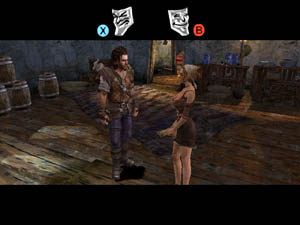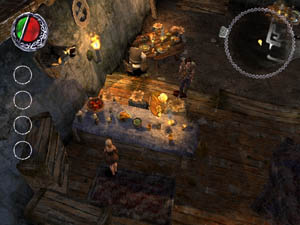|
Bard's Tale
I remember in the
old days (1985) when Bard's Tale was something of a first on the
Commodore 64 that was truly one of the most unique role-playing game
(RPG) experiences of all time. Not only did the original Bard's Tale
have state-of-the-art 3D graphics but it also contained one of the most
involving storylines that kept my friends and myself up for hours upon
hours. Although Bard's Tale spawned a variety of sequels and of course a
plethora of imitations, the series soon vanished from the face of the
planet until the original creator, Brian Fargo, decided to re-release
the game to a new audience that also promised to take RPG titles to the
next evolutionary stage... with humour being a key player.
As with all good
console RPG's (Baldur's Gate and Fable), the successful diet of a good
adventure game contains a healthy dose of action and of course a variety
number of puzzles. The game is extremely reminiscent of the Baldur's
Gate: Dark Alliance and transforms the player into a "loveable" bard who
must use his wit and his magical instruments to defeat a plethora of
different enemies in order to win the heart buxom wenches from around
the realm.
As mentioned earlier, Bard's Tale revolves around a reluctant bard who
has become the unwilling hero to a hero less land. Unlike the standard
hero archetype, our character is more interested in bedding women and
finding out where his next ale is coming from. As you can see, Bard's
Tale is a humorous take on the world RPG titles and surprisingly enough,
the mix of humour, action and RPG mend quite well. Fortunately the
extremely talented Cary Elwes lends
his talents to the voice of the Bard who actually makes the game more
interesting than its actually is. For those uninitiated to the genre of
RPG's, the first
level or area of Bard's Tale is basically a tutorial about the game and
teaches the player how to manipulate the character in this RPG world
from fighting to spells.
The control scheme is straightforward with
the left stick controlling the Bard and the right stick used to
manipulate the isometric camera or view different scales of the world
map. The face buttons are used to attack, defend, jump and to access a
context sensitive action function. Where the system is unique is in the
many summon abilities that the Bard will learn through tunes and gifts.
This is both a blessing and a curse as the system works well, but it can
be a bit cumbersome to actually use. For example, a quick pull of the
right trigger will show categories of tunes that the Bard has learned
and then pressing the appropriate face button will summon a particular
creature or character.
Depending on the Bardís rhythm attribute,
the greater the summoned helper will perform. The problem is that the
action doesnít stop while you are trying to navigate the series of
trigger pulls and button presses. Therefore most of the battles become a
repetitive sequence of run, summon and attack. And donít even think of
taking on enemies solo or you wonít get far due to their tenacity. Melee
attacks prove useful (far more so than ranged attacks), but all actions
seem to stutter a bit between the time you press a button and the actual
execution. Being that the enemies donít seem to suffer from the same
delay, youíll need to rely quite a bit on summoned characters to
survive.
For those gamers that are looking basically for a hack-n-slash game with
just a sprinkle of RPG elements, then The Bardís Tale should be your
first choice. What RPG aspects the game does have are scaled back quite
a bit. The game does stick to the standard health, mana and experience
system of other action RPGs and the Bard does have 6 main attributes
that can be levelled up to your liking. Youíll be able to learn a number
of talents that will increase the Bardís effectiveness during quests;
things like dual-wielding and the Blade Dash. Tunes, which are
essentially the equivalent of magic are also acquired and subsequently
added to the Bardís list.
Graphically, Bard's Tale is a rather
impressive looking game on the XBox and contains some extraordinary
background environments that sometimes appear almost photo-realistic.
The characters in the game also contain a fairly high polygon count with
some realistic textures for that extra realism. There is also a variety
of special effects in the game from particle lighting to some of the
nicest looking lighting to have every graced an XBox game. The only
downside to the graphics are the sometimes annoying camera angles (that
fortunately can be moved) and also the rather "dodgy" looking cutscenes
that use the in game graphics engine to push the storyline along. Apart
from that, Bard's Tale has a rather sturdy graphics engine, although a
little dated in some parts.
The musical score of Bard's Tale uses the traditional RPG style of music
that even though the game is more humorous than serious, it actually
suits the genre of the title. The main draw card of the audio department
is the talent of Cary Elwes who plays the bard himself and match that
with some other first class character actors such as Tony Jay and you
truly have one excellent sounding game. The sound effects of the title
contains all the usual grunts, squeals and screams of various monsters
that flawlessly goes in hand-to-hand with the graphics.
In conclusion, Bard's Tale is a rather interesting game that contains
enough elements of humour and RPG to make this one addictive game.
Unfortunately some gamers may find this mix unsuitable for the genre but
it does help increase a much needed boost of originality into the RPG
market. The average gamer will take around 25 to 30 hours to
successfully complete this game and I would recommend this title to
anyone who enjoyed the Baldur's Gate series of RPG titles for this is
the only fix they will get for a long time. Check it out!.

 |